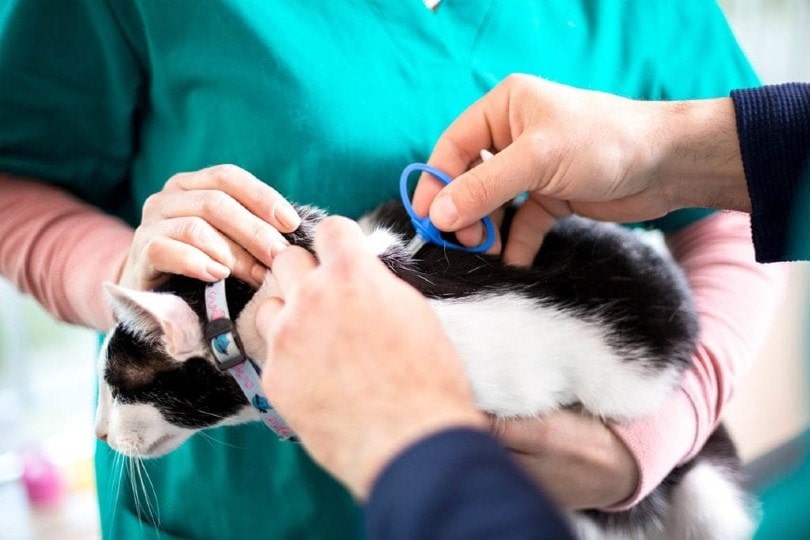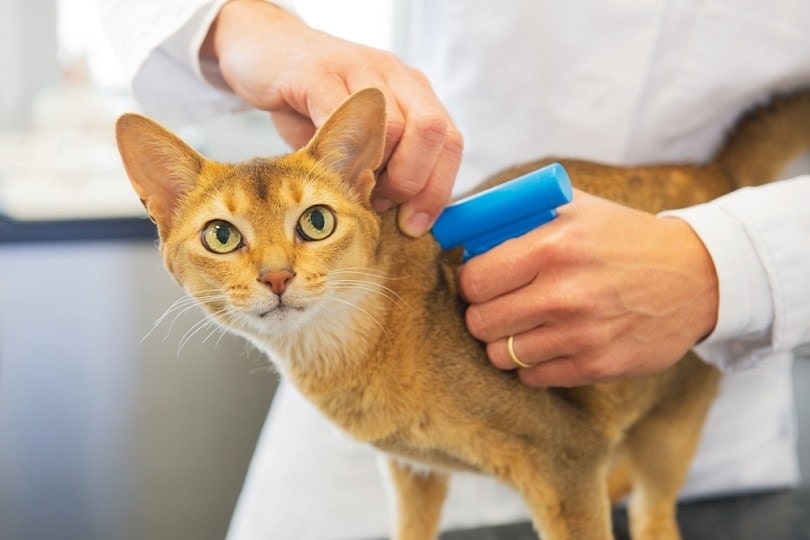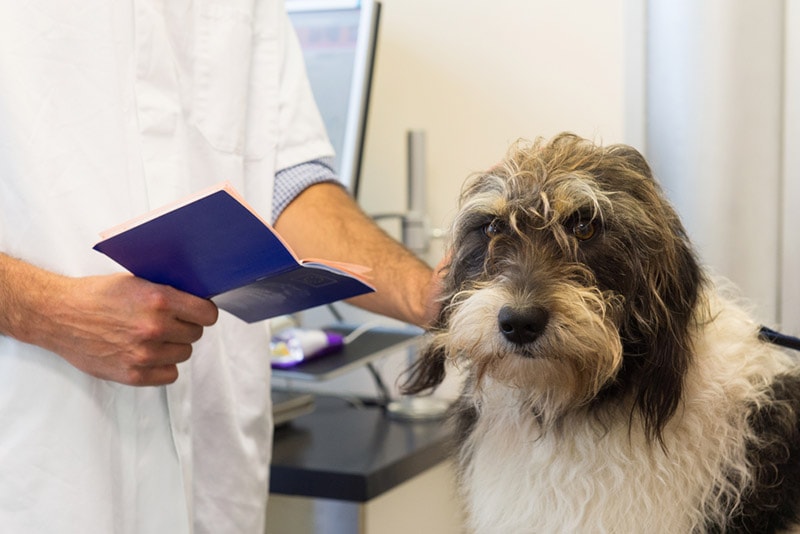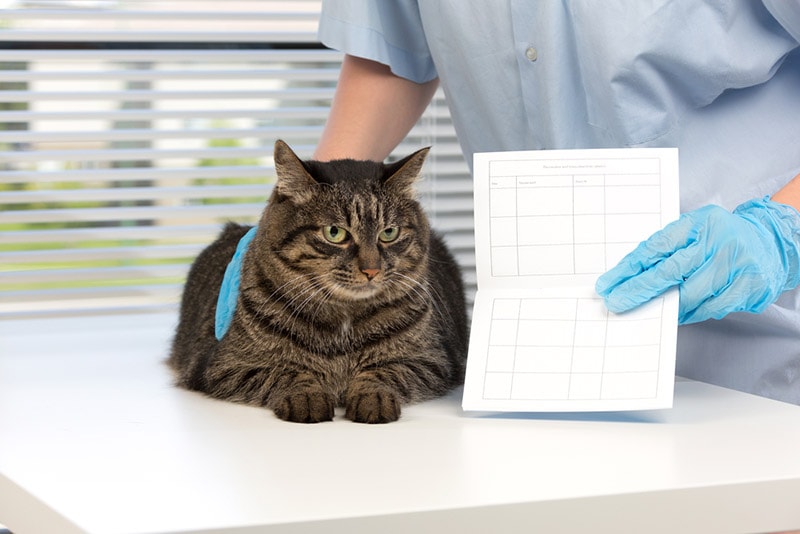What Is the Cost to Microchip a Cat or Dog in Canada? (2024 Price Guide)
Updated on

Microchipping is not always mandatory, but more and more pet parents are having their cats and dogs microchipped, anyway. In Montréal, you must have your cat or dog microchipped by the time that they are 6 months of age.
If you’ve had your pet for a while or got a new one and are debating on having them microchipped, you might have a few questions about how much it will cost you. Generally, microchipping your cat or dog can cost between $30-$100 depending on your location.
Here’s an idea of how much you might pay in Canada and other information about how microchipping works.
The Importance of Microchipping Your Cat or Dog
Microchipping is one of the most important things that you can do for your pet to protect them if they ever get lost. Losing a pet can be an unfortunate aspect of pet ownership and a big fear that we all have. A microchip can give you welcome peace of mind.
The microchip uses radio frequency and contains a unique identification number. It doesn’t emit any kind of power and doesn’t use batteries, so it’s essentially inert until it’s scanned. This activates the microchip and provides the vet with your pet’s ID number.
The procedure of microchipping is simple and relatively painless. The microchip itself is about the size of a grain of rice and is injected under the loose skin between your pet’s shoulder blades. It stays there for the rest of your pet’s life.
Microchipping can make a big difference in having your pet returned home. A study at 53 animal shelters of 7,704 stray dogs found that dogs without microchips were only returned to their owners 21.9% of the time1. However, dogs with microchips were returned to their owners 52.2% of the time!
Stray cats without microchips were reunited with their owners only 1.8% of the time, and microchipped cats were brought back home 38.5% of the time!
How Much Does Microchipping Cost?
The cost of microchipping your pet depends on where you live in Canada and your veterinary clinic. If you already have a vet, check their website, or call the clinic and they can let you know the price. Some clinics offer a discount or have free microchipping if you get your pet microchipped at the same time as getting them spayed or neutered.

Here are the prices from various clinics in major cities across Canada. This should give you a better idea of how much it might cost you where you live.
| Location | Microchip Cost |
| St. John’s Newfoundland | $30 – $50 |
| Montreal, Quebec | $40 – $100 |
| Toronto, Ontario | $75 |
| Winnipeg, Manitoba | $64.50 |
| Saskatoon, Saskatchewan | $83 |
| Whitecourt, Alberta | $50 |
| Vancouver, British Columbia | $28 |
The prices can vary from clinic to clinic, though you can generally expect to pay $50 to $100. Humane Societies and SPCAs also offer microchipping at a discounted price, which can be $15 to around $30.
Sources: Torbay Road Animal Hospital (Newfoundland), Clinique Veterinaire Vaudreuil (Montreal), Beaches Animal Hospital (Toronto), Centennial Animal Hospital (Winnipeg), Arlington Animal Hospital (Saskatoon), Hilltop Veterinary Clinic (Whitecourt), Atlas Animal Hospital (Vancouver)
Additional Costs to Anticipate
Most microchipping registries provide free registration, which means it’s free to register your pet, and it won’t cost you anything if your pet goes missing and is found and returned to you.
That said, some registries charge a fee for extra support. For example, 24PetWatch has free registration but offers the option of a paid lifetime membership for $100. The company states that this is like 911 for pets, giving you 24-hour support to get your pet returned to you faster.
These costs are additional, and if it isn’t in your budget to pay for a membership, look for companies that don’t charge you anything to register your pet.

Do Microchips Need Replacing?
No. Microchips stay in your pet’s body for their entire life. They never stop working because they aren’t powered in any way and are inactive until scanned.
While it’s rare, some microchips might migrate from where they were implanted, which can make it harder for a scanner to find them, though most scanners have a wide range.
Speak to your vet if you’re concerned, and they might implant a new one. But most clinics and shelters know to scan a pet in other areas if they don’t read the chip in its usual location.
Does Pet Insurance Cover Microchipping?
It’s not common for pet insurance companies to cover the cost of microchipping, primarily because most insurers don’t cover preventative care. Even if you opt into a wellness care package, microchipping might still not be covered.
That said, a few pet insurance companies do cover microchipping as part of wellness care, including Pets Plus Us.
But considering that the cost of microchipping isn’t that expensive and it’s a one-time fee, you shouldn’t prioritize the coverage of microchipping when shopping for pet insurance.

Keeping the Microchip Up to Date
When you initially register your pet’s microchip, you’ll be providing your contact information, like your pet’s information, your address, and your phone number.
Without registering the chip, whoever finds your pet will have no way to contact you. When a pet is adopted or even if they come from a breeder, they will often already be microchipped, but it’s still up to you to register the chip. This can often be done quite quickly online, or you can do it over the phone.
But if you move or any of your information changes, like a new phone number, you must remember to update the information with the microchip registry. Without updated contact information, the microchip is almost useless.
The main reason that some microchipped animals are not reunited with their owners is that their pet owners hadn’t registered the microchip or didn’t update it when there was a change in information.
This highlights the importance of keeping on top of registering your pet’s microchip!
Conclusion
Microchipping your pet is a cost-effective way of ensuring that your lost or stolen pet can be returned to you. Tags and collars get lost, and every time you move, instead of quickly updating the information online, you must order a new tag, which can add up over the years.
A microchip will always be with your pet. Even if you have an indoor cat, it’s still recommended to microchip them because they’re more than capable of sneaking outside.
So, in the long run, microchipping is an added expense, but considering the peace of mind that you’ll have after the procedure, it’s totally worth it!
Featured Image Credit: Lucky Business, Shutterstock










